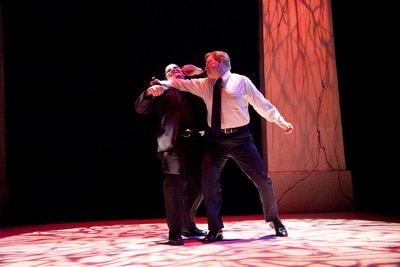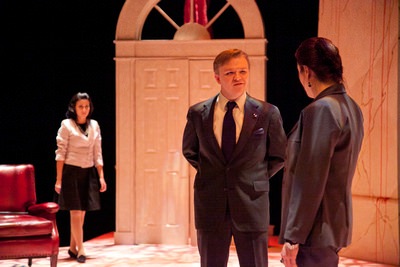On stage, a man tosses and turns in his sleep. Nearby in an overstuffed leather chair, a woman rests. The view from the audience, on bleachers overlooking the stage, is intimate. And “intimate” may be the best word to describe Brutus, the intriguing – if uneven – psychological take on Shakespeare’s Julius Caesar now playing at The Catholic University of America.

Seth Rosenke as Brutus (white shirt) and Robert Pike at Caesar
Brutus is the brainchild of Allison Fuentes, an MFA directing candidate with the not-incorrect insight that Shakespeare’s original work was barely about the title character at all. As well as from cutting the text down to focus on Marcus Junius Brutus, Fuentes adds a few additional twists: Lucilio and Strato (two servants) are combined to form Lucy, Brutus’s daughter; Brutus, in turn, is Caesar’s illegitimate son; Cassius is a woman, and Brutus may be in love with her. While Shakespeare purists may balk at the alterations, the end result is an interesting look at the line between personal and political relationships as well as the dangers of dynasty.
Playgoers have time to take in the scene, designed by Dr. Thomas Donahue, before the action starts, and there are plenty of clues as to what’s coming. A low marble stage surrounded by pillars evokes ancient Rome, but the contemporary double-doors in the corner suggest that we’re really looking at something neo-classical: Washington, DC, a fit setting for the sharp suits and power politics. The cleverest part of the set may be Brutus’s bed, a simple platform that doubles as a table and settles seamlessly into the stage with a “thunk” so satisfying it’s a shame the sound isn’t worked into the action. But before we’ve even started, the production already seems a little ahead of itself – both the pillars and bed are dripping with blood, which seems odd for a play traditionally concerned with whether or not there will be an assassination.
Both the strength and weakness of the production stem from the director attempting to do so much with so little; this may be the first time I’ve ever wished that a work of Shakespeare had been longer. The upside is that the play’s focus is laser sharp, and Seth Rosenke’s Brutus is a character worth focusing on. We spend a lot of time with Brutus, and his frequent monologues give us the feeling that we’re living inside the man’s head. Everything that doesn’t deal directly with Brutus has been stripped away from Shakespeare’s work. While Antony gives his famous “Friends, Romans, countrymen” speech off-stage, the audience is treated to Brutus mentally – and physically – wrestling with the dead Caesar. Moments of introspective surrealism like this leave us with the possibility that much of the play is happening in Brutus’s guilt-ridden dreams. The lighting by Martha Mountain tends toward ghastly greens and reds, further enhancing the idea of a sickness in both the mind and the body politic. It’s Shakespeare by way of Poe.
With the play itself so tightly focused on one character, it would be easy to make the mistake of ignoring the supporting cast. Kimberlee Wolfson works well as Cassius (though I miss Caesar’s description of the “lean and hungry look”), and it’s impressive that the relationship between Cassius and Brutus is at its most nuanced during the play’s added moments of intimacy. Sadly, these come and go too quickly for them to really sink in – again, I wish that Fuentes had more time to fully explore her ideas on stage. The introduction of Lucy is an interesting change to the script. Fuentes makes good use of two otherwise minor characters – and Nina Marti’s acting talent – to add a new layer to the play, but Lucy’s inclusion in every scene often leaves Marti with nothing to do on stage.
If there’s a real disappointment – it’s that the actors who have the best chemistry with Rosenke have the least time with him. Robert Pike’s Julius Caesar is on the stage for mere moments, but for that short span he commands the space. This is Caesar as big man on campus, with the easy charm of a born politician and the physical stature of a football hero. It’s easy to see why men follow this Caesar, and the mutual love and respect that Caesar and Brutus share is obvious. Latia Stokes’ single scene as Portia is even more impressive. Stokes may have the best command of verse out of anyone in the cast, and the acting chops to back up the words. The opening night audience included a slightly chatty high school group, but Stokes demanded and received their full attention and silence. That silence was broken by a collective gasp when Portia stabbed herself in the thigh to prove her worth. Shakespeare always requires some suspension of disbelief, but this Portia being left out when other women are involved seems too far-fetched. If Lucy and Cassius are part of the conspiracy, why not Portia?
In the end there are too many good ideas in Brutus, and the quick pace and cuts in the script take their toll on the production. With little time to work, the cast’s intensity starts at 11 and doesn’t seem to drop. Even an invitation to dinner is loaded with menace, underscored with ominous music. What should be nuance is reduced to inconsistency. The reasons for Caesar’s death are perfunctory; the mechanics of the assassination are unclear. The play as a whole seems episodic. Most noticeably, the jump from Caesar’s assassination to the military camp at Sardis skips over wide swaths of the plot. If you’re not already familiar with Julius Caesar, there’s nothing to explain why we’re suddenly talking about armies and countrysides and this Octavius guy.

Nina Marti as Lucy, Seth Rosenke as Brutus and Kimberly Wolfson as Cassius
Fuentes has a deft hand at staging and the vision to match. Her big moments are immensely watchable, and the play’s final battle is particularly impressive for the effortless way she modernizes the combat. With a little more reworking and a possible workshop this ambitious production will be worth revisiting.
Running Time: 90 minutes, with no intermission.
Brutus plays through February 24, 2013 at The Catholic University of America’s Hartke Theater – 3801 Harewood Road, N.E,. in Washington, D.C. For tickets, call the box office at 202-319-4000, or purchase them online.





